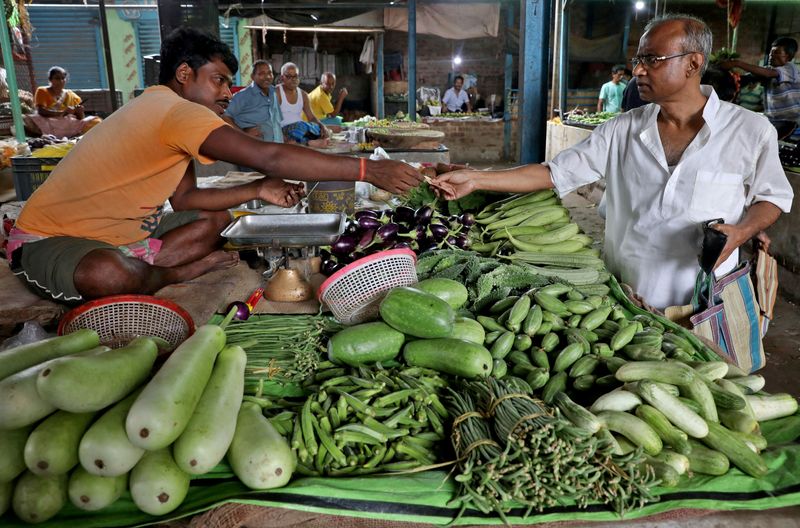By Anant Chandak
BENGALURU (Reuters) - Retail inflation in India likely eased a bit last month but stayed above the Reserve Bank of India's upper threshold for a second straight month, keeping the central bank on course for further policy tightening, a Reuters poll found.
Rises in food prices, which account for nearly half of the Consumer Price Index (CPI) basket, likely moderated last month. However, the bulk of the slowdown probably came from easing international prices and the government's efforts to provide additional supplies of wheat.
Despite those temporary measures, lower crop yields because of warmer-than-usual temperatures last year and this year were likely to keep inflation elevated in the near-term period.
The March 2-9 Reuters poll of 43 economists showed inflation, as measured by the CPI, likely fell to an annual 6.35% in February from 6.52% in January.
Only one economist expected inflation to fall below the 6.00% mark, the upper limit of the RBI's tolerance band. Forecasts ranged from 5.89% to 6.70% for the data, which are due to be released at 1200 GMT on March 13.
"With vegetable prices normalising, inflation has started to harden as the inherent price pressures have barely shown any meaningful signs of moderation. In fact, food inflation ex-pulses and vegetables has now reached a nine-and-a-half-year high," wrote Kunal Kundu, India economist at Societe Generale (OTC:SCGLY).
"While we do not expect a sharp rise in inflation over the next few quarters, the pace of easing would be much slower than expected, especially given the likely impact of El Nino weather condition on food prices. We cannot rule out (a) further upside surprise to inflation."
An El Nino weather pattern usually results in below-average rainfall, cutting yields and pushing up food prices.
A weaker rupee, which fell around 10% last year and is expected to recover only some of those losses in the coming months, is also adding to upward price pressures.
Core inflation, which excludes volatile food and energy components, was also expected to remain sticky.
While data for core inflation is not released by the government, some economists said it likely remained above 6.0% in February.
Minutes from the RBI's latest meeting showed the central bank was concerned about persistently high core inflation, leaving the door open for more policy tightening.

"For the RBI, it's a close call at its next meeting - we see the balance of risks between 'hold' and 'hike' as even. If next week's news on inflation in February disappoints, the RBI could easily be swayed into another hike," wrote Alexandra Hermann, lead economist at Oxford Economics.
A separate Reuters poll showed inflation would not reach the RBI's medium-term inflation target of 4% by the end of next year.